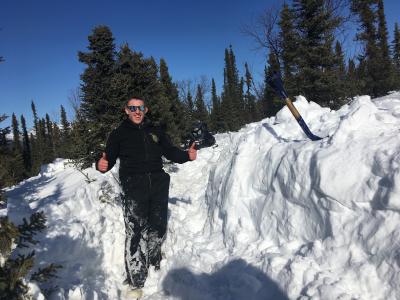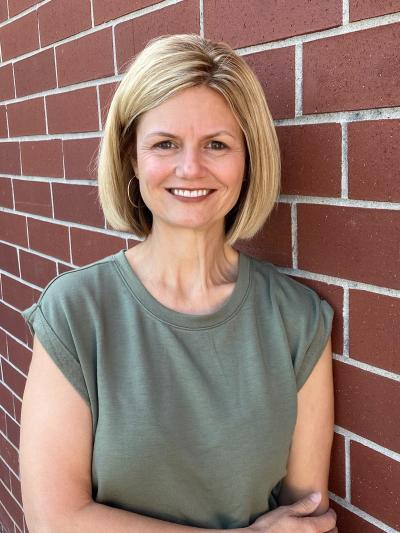Alumni reflections: Life during a pandemic
COVID-19 left vacant office buildings and empty classrooms across the country and sent flocks of workers and students home. In many ways, life seemed to grind to a halt, but for two College of Education alumni, the global pandemic resulted in a frantic year.
From the depths of the Alaskan wilderness to the virtual hallways of a Des Moines elementary schools, these alumni tell us how the pandemic altered their working lives.

Sam Braband, Ranger
Sam Braband ('10, BA) has a job where the concept of “working from home” doesn’t really apply.
As chief ranger for the northern region of the Alaska State Parks, he’s never quite certain what a day will bring. Tasked with helping oversee, maintain and enforce hundreds of thousands of acres of rugged, backcountry wilderness on the untamed fringes of the country, Braband could be responding to a wildfire or maintaining snowmobile trails or chasing wildlife from a campground. It’s what he loves about the job.
“There’s so much diversity to what I do in this job,” Braband says. “It keeps me on my toes and excited to go to work.”
And when COVID-19 hit and travel restrictions became more onerous, it would seem logical that park attendance might dip. But the opposite occurred. The pandemic prompted a marked increase in park attendance, as Alaskans, who are used to frequently traveling outside the state to see friends and family, were kept in by the travel restrictions.
“We saw more use in our park units this last season than years prior,” Braband says. “And I think it's because people weren't leaving the state. It was busier and more challenging in a lot of ways.”
The increased attendance made normal occurrences more dire, especially those forces over which a global pandemic holds no sway. Wildfires, for instance.
 Recently, in late June, an Alaska Fire Service helicopter spotted a column of smoke. The fire started slowly, but by early July had rapidly increased in size, prompting Braband to clear and close trailheads and prepare for an evacuation. One morning, he woke up at 6 a.m. to a call that a bear had gotten into the kitchen of a fire service crew.
Recently, in late June, an Alaska Fire Service helicopter spotted a column of smoke. The fire started slowly, but by early July had rapidly increased in size, prompting Braband to clear and close trailheads and prepare for an evacuation. One morning, he woke up at 6 a.m. to a call that a bear had gotten into the kitchen of a fire service crew.
Other days could be more mundane, where Braband would make contact with campers and hikers at trailheads. And then there are times when he enforces laws and restrictions. As a member of the U.S. Forest Service, Braband is a fully commissioned peace officer.
“I’ve responded to some pretty hot calls with the Alaska State Troopers,” Braband says. “I’ve been the first responder for someone who got shot and helped track down an arsonist.”
Chasing out bears and catching arsonists wasn’t on Braband’s mind when he came to UNI from Des Moines Valley High School. He only knew he wanted a different experience.
“I was really looking for a unique experience where I could branch out on my own,” Braband says. “And I’m really happy with my decision to attend UNI because I had an awesome time there.”
Finding a career in the outdoors
While he earned his degree in leisure, youth and human services with an emphasis on outdoor recreation, Braband threw himself into outdoor works. He helped with trail construction and controlled burns with the Tallgrass Prairie Center and worked with the Outdoor Recreation Program guiding students on trips.
He also participated in the national student exchange program, traveling to the University of Alaska southeast, where he earned a certificate in outdoor studies and picked up lessons in ice climbing, mountaineering, glacier travel, crevasse rescue and others.
For Braband, UNI offered everything he could imagine.
“The sky was the limit. You're only limited by your own imagination,” he says. “If you wanted to do something you could probably figure out somebody to help support you and help make that happen.”
After graduating, Braband joined the trail crew of the U.S. Forest Service in the Bob Marshall Wilderness in northwest Montana, where he also spent two years working as a river ranger. He also worked with the outdoor recreation programs of both Sacramento State University and the University of Alaska Fairbanks before becoming the chief ranger of the northern region of the Alaska State Parks.
And while park activity and attendance is starting to come back to normal, he said he looked back on the frantic year of COVID fondly.
“Being able to connect with the natural world is really important for our human existence and I think during stressful times having some place in nature that you can go and kind of recharge and restore is really critical,” Braband says. “And while our park units were in some ways overwhelmed by COVID, it definitely felt good to be able to be a part of providing that kind of escape for people during the pandemic.”
Traci Shipley, Principal
 Traci Shipley ('13, ASC Principalship) was used to working long days as principal of River Woods Elementary in Des Moines Public Schools. She’d regularly come in at 6:30 a.m. and stay until at least 5 p.m., managing faculty and students, meeting with parents and sending out school-wide communications. But when COVID-19 hit, her days got even longer and unpredictable. “Things were changing so continuously … nobody knew what the best thing was to do, every decision was unprecedented,” she says.
Traci Shipley ('13, ASC Principalship) was used to working long days as principal of River Woods Elementary in Des Moines Public Schools. She’d regularly come in at 6:30 a.m. and stay until at least 5 p.m., managing faculty and students, meeting with parents and sending out school-wide communications. But when COVID-19 hit, her days got even longer and unpredictable. “Things were changing so continuously … nobody knew what the best thing was to do, every decision was unprecedented,” she says.
Shipley was undeterred. With the support of her district and the help of her assistant principal and staff at River Woods, Shipley facilitated drive-by events, where families could pick up sack lunches and homework packets and technology; attended meetings to make plans for hybrid and virtual class schedules; and even went to families’ homes to help them access and understand the tools they’d need for virtual learning. It was challenging but necessary says Shipley, who describes herself as a “hands-on principal,” but it was also a lot to process day after day.
“I feel like everything that everybody went through, every emotion everybody went through, I went through it, too, but I went through it quicker,” says Shipley. “There was just so much that had to be done … I just had to keep pushing forward.”
She credits UNI with giving her the passion to push through challenges (she holds an advanced studies certificate (ASC) in educational leadership from UNI) and encourages other educators to see challenges as a learning experience. “UNI really instilled in us that it's not OK just to be mediocre. You need to give 110 percent,” she says. “Don't focus on the negative. Focus on the positive, and take every opportunity that you have as a learning opportunity to do better. We learned a lot of things that we will do differently to support our students post-COVID.”
Some of the things Shipley learned include the benefits of social distancing on campus — Shipley said that in addition to helping prevent the spread of COVID, social distancing markers helped students with body and voice control an she plans to keep them up in the school year-round. She also learned just how much can be accomplished with a strong team and the right attitude.
“Teachers can do amazing things; schools do amazing things. And we do it with little guidance, little financial resources. We figured it out,” she says. “Any challenge that I face, after being an administrator during COVID, it's just like a small bump.”
